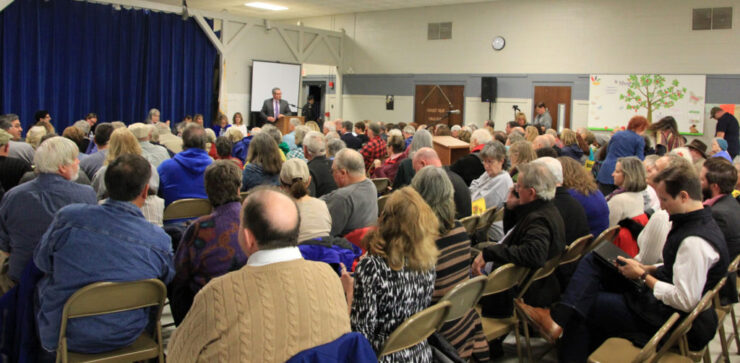Senate Bill Will Strip Public Of Knowledge And Participation In Land Development Proposals
UPDATE: This week the Rhode Island Legislature did pass this bill that eliminates a public process for many land development projects. We’ll have more about this in the future.
For at least 30 years, development has been classified in Rhode Island as administrative, minor, and major. An administrative subdivision is one in which a lot line is moved between two lots in common ownership, but no new lots are created. A minor subdivision is 5 or fewer lots, and a major subdivision is six lots or more.
Administrative subdivisions are reviewed by the Town Planner; there is no notice to abutters or the public and no public meeting. There is a similar process for very small changes to a commercial property. But these subdivisions are genuinely small and the change in lot line or a small building addition often goes unnoticed and results in little to no impact on the neighborhood.
Review of minor and major subdivisions and commercial development requires notice to abutters, advertisements, posting of a meeting agenda with informative packets showing development designs and impacts, and public meetings where neighbors and others can be informed, ask questions, provide input, and become involved in decisions that impact their property values and the environment we all share.
The process is proposed to change radically by changing the definition of what is a major subdivision to include only the much bigger and more impactful developments and thus redefining as administrative other subdivisions formerly classified as minor and major. This will exclude the public from any knowledge of proposed developments and move all the reviews to the Town Planner in private meetings with the developer.
Neighbors could wake up one morning to bulldozers on a property next door having no idea of what is happening and without having been able to share their knowledge of the property or how this development may impact their own land or the environment.
For example, a Dollar General, which in the past brought out nearly 400 people to public meetings, could be approved and construction begun in Cross’ Mills without a single member of the community knowing it had been proposed.
The Town Planner and other town staff do not want this process that excludes the public and pushes all the work and responsibility of development review to one person who also will now under this law have a reduced number of days to make decisions. Appeals of Town Planner decisions will go directly to Superior Court rather than to the local Zoning Board, adding considerable expense for the town and intimidating the Planner. Towns will likely have to add staff to the Planning and Zoning departments if this law passes.
Excluding neighbors and the general public from participation and even knowledge of developments that can change the landscape and character of our community may save developers a little meeting time, but it is not good government or good environmental policy. It is certainly not democratic.
Please contact your state senators and ask them to oppose RI Senate Bill 1034 or any substitute bills that remove or limit the public participation component of the review and approval of subdivisions and commercial developments.
- Charlestown’s Senators Victoria Gu: sen-gu@rilegislature.gov and Elaine Morgan: sen-morgan@rilegislature.gov and South Kingstown Senator Susan Sosnowski: sen-sosnowski@rilegislature.gov
- Find other State Senator e-mails here: http://webserver.rilegislature.gov/Email/SenEmailListDistrict.asp

You can learn more about the author, Ruth Platner, at her profile page.
The banner image is a photo of a public hearing for a controversial development proposal in Charlestown.

July 1, 2023 @ 9:40 am
It seems like this state is speeding up the process to strip our rights away from us. We the people can’t allow this to happen on any front (economics, technology, science, etc.) It seems as though we’ve opened our homes to the marauders.
June 17, 2023 @ 10:17 am
I wrote to the senators to register my adamant opposition to this bill, however, it has apparently fallen upon deaf ears. Just another example of how little they care about the people and how much they care about their own pockets.
June 7, 2023 @ 3:52 pm
We live in a famously corrupt state. The question should be ,who’s making the money?
June 7, 2023 @ 8:55 am
Good Lord, who thinks up these things…..we want more open government, not less.
Will write to legislators.